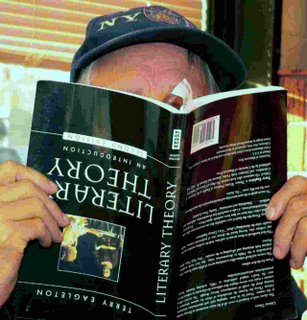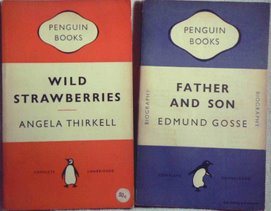CPE's 'Reading Nietzsche' Online while Blogaulaire Reads Aloud from the Paperback Book
I have the paperback edition in my lap, as I read a completely variant translation in English of the same text: Nietzsche's Thus Spoke Zarathustra.
The online version on my monitor is from www.bibliomania.com/ . SEE this LINK.
My trade paperback version is:
Thus Spoke Zarathustra, translation by. R. J. Hollingdale (Baltimore, Md.: Penguin Books, 1961/69).
My memory of other translations, of other works by Nietzsche, is being thoroughly jogged as I recall debates in college over mis-translation of Nietzsche, particularly other works that seemed so important to budding 'thinkers' or whatever. I am thinking of what was published using the title "The Will to Power", translated by Walter Kaufmann and R. J. Hollingdale (New York: Vintage, 1968).
It irritates me that what I see on my screen at Bibliomania, which is the entire Zarathustra (like the book in my hands), offers NO bibliographic citations, not even the name of a translator. If there are links, the only ones I can find are ads for yogic and esoteric sites offering their own esoteric 'spins' about Nietzsche the 'madman' philosopher. Yech!
At the same moment (thanks to googling) I can hop over to Pillwebb.net and find an ample number of bibliographic citations, but none that clarify which (if of any) translation refers to the online text at Bibliomania. (See the very end of the quoted section below - see how Bibliomania vaguely takes credit for an entirely original (their own copyrighted) version of Nietzsche's classical philosophic fable!)
Another odd thing is that the online text has a style that is very Biblic, almost Old Testament. I can guess that the on-line text must be a version that antedates Hollingdale and certainly the 'modern'Kaufmann in the period when the two collaborated.
In my softcover "Hollingdale Translation" in the Penguin edition (1961/69), I read, as an example of one way his translation differs from what we'll call "the Bibliomania Translation", in HT I read the terms 'Ultimate Man' while in BT I read 'the Last Man'.
But search me, scanning all the online material displayed at Bibliomania leaves the reader completely up in the air; the links do not tempt one to consult ANYTHING, especially not the original German text. Every translator's introduction of Nietzsche under the sun and between bound covers raises such issues. But that's not the style for on-line text versions. Here it's 'Hail the accessibility of e-books'. 'Hail reading in total ignorance.' Ignorance of all issues of interpretation, translation or inter-textual disagreements between editors.
The following 'fair use' citation can be followed in HT on p 45 to p 47. You can surf over to Bibliomania's BT version at Phill Webb (dot) net 
5
Alas! there cometh the time when man will no longer launch the arrow of his longing beyond man — and the string of his bow will have unlearned to whizz!
I tell you: one must still have chaos in one, to give birth to a dancing star. I tell you: ye have still chaos in you.
Alas! There cometh the time when man will no longer give birth to any star. Alas! There cometh the time of the most despicable man, who can no longer despise himself.
Lo! I show you the last man.
‘What is love? What is creation? What is longing? What is a star?’ So asketh the last man and blinketh.
The earth hath then become small, and on it there hoppeth the last man who maketh everything small. His species is ineradicable like that of the ground-flea; the last man liveth longest.
‘We have discovered happiness,’ say the last men, and blink thereby.
They have left the regions where it is hard to live; for they need warmth. One still loveth one’s neighbour and rubbeth against him; for one needeth warmth.
Turning ill and being distrustful they consider sinful: they walk warily. He is a fool who still stumbleth over stones or men!
A little poison now and then: that maketh pleasant dreams. And much poison at last for a pleasant death.
One still worketh, for work is a pastime. But one is careful lest the pastime should hurt one.
One no longer becometh poor or rich; both are too burdensome. Who still wanteth to rule? Who still wanteth to obey? Both are too burdensome.
No shepherd, and one herd! Every one wanteth the same; every one is equal: he who hath other sentiments goeth voluntarily into the madhouse.
‘Formerly all the world was insane,’ say the subtlest of them, and blink thereby.
They are clever and know all that hath happened: so there is no end to their raillery. People still fall out, but are soon reconciled — otherwise it spoileth their stomachs.
They have their little pleasures for the day, and their little pleasures for the night: but they have a regard for health.
‘We have discovered happiness,’ say the last men, and blink thereby.
And here ended the first discourse of Zarathustra, which is also called ‘The Prologue’: for at this point the shouting and mirth of the multitude interrupted him. Give us this last man, O Zarathustra, they called out. Make us into these last men! Then will we make thee a present of the Superman! And all the people exulted and smacked their lips. Zarathustra, however, turned sad, and said to his heart:
They understand me not: I am not the mouth for these ears.
Too long, perhaps, have I lived in the mountains; too much have I hearkened unto the brooks and trees: now do I speak unto them as unto the goat-herds.
Calm is my soul, and clear, like the mountains in the morning. But they think me cold, and a mocker with terrible jests.
And now do they look at me and laugh: and while they laugh they hate me too. There is ice in their laughter.
---------
The the closest Bibliomania comes to offering a credit/citation is:
How do I cite a Bibliomania work?
We do not have full bibliographic data for the texts on Bibliomania, and they were typed from scratch, repaginated and reformatted hence these works are an original edition and should be cited as copyright Bibliomania.com Ltd 2000.
What one finds for 'Zarathustra' as bibliographic references at Phillwebb.net:
Also Sprach Zarathustra: Ein Buch für Alle und Keinen. 1883-1885.
Thus Spoke Zarathrustra: a Book for All and None.
Trans. Graham Parkes. Oxford: OUP, 2005.
Trans. R. J. Hollingdale and Walter Kauffmann. Harmondsworth: Penguin, 1978.
Trans. Walter Kaufmann. New York: Viking, 1954.
Note - from Blogaulaire:
Do not blindly follow the links on Phillweb - you will end up with a videogame entitled 'Beyond Good and Evil' (Ubisoft).



No comments:
Post a Comment